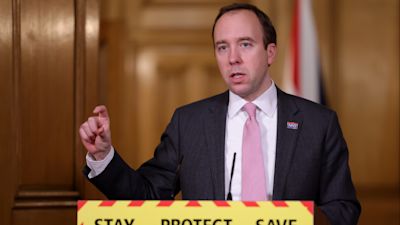'Take extra special precaution': Postcodes revealed where South African Covid variant identified as 80,000 to be tested

Video report by ITV News Health Editor Emily Morgan
Tens of thousands of people in a number of postcode areas have been told to take "extra special precaution" in order to avoid spreading the South African variant of coronavirus.
Health Secretary Matt Hancock warned that 105 cases of the fast-spreading variant have been identified in the UK, 11 of which have no link to international travel, which suggests the strain has been passed on through community transmission.
There is no evidence to suggest the new variant is more deadly compared to the original strain, Mr Hancock said, but "we need to come down on it hard".
He said cases had been identified in the following areas: East of England (EN10) , London (W7, N17, CR4), North West (PR9) , South East (ME15, GU21) , West Midlands (WS2).
Here's everything we know so far about the South African variant in the UK:
Appealing to people living in those areas, Mr Hancock said: "Stay at home and lets get this new variant totally under control."
Around 80,000 residents in parts of Surrey, London, Kent, Walsall, Southport and Hertfordshire will be offered a PCR Covid test – which can provide swift results on the same day – in a bid to curb the variant’s spread.
Quick Covid tests will be carried out door-to-door in the affected areas to identify where the South African variant is, in order to "stop chains of transmission".
Hospital staff in the areas affected by the South African Covid variant strain are being asked to work from home, ITV News Political Editor Robert Peston reports.
In a letter sent to healthcare workers in the South East (ME15), staff are also being asked to undertake a lateral flow test if they are due to work clinically from Tuesday.
Along with this, it is hoped England's lockdown will bring down levels of the new variant, but Mr Hancock admitted "it's not straight forward".
He admitted it's likely there are more cases of the South African variant that have not been identified, as he urged people to stringently follow the rules.
Speaking at a Downing Street press conference, Mr Hancock said: "The most important thing is that people in the postcode areas outlined need to take extra special precautions.
"It is absolutely vital that people in those areas minimise all social contact and get a test when the opportunity arises.
"It's a big effort getting this new variant... essentially finding every single case of it, that is the goal."
ITV News Political Editor Robert Peston explains what the South African variant could mean for the easing of lockdown
Mr Hancock added that the government contact tracing system now finds 95% of contacts.
"It has built up to this very effective level," he said.
Prime Minister Boris Johnson played down fears about vaccines being ineffective against different variants.
During a visit to the a vaccination centre in Batley, West Yorkshire, Mr Johnson told reporters: “We are confident that all the vaccines that we are using provide a high degree of immunity and protection against all variants.”
He said the vaccines could be adapted to deal with new variants if necessary.
“The fact is we are going to be living with Covid for a while to come in one way or another,” he added.
“I don’t think it will be as bad as the last 12 months – or anything like – of course, but it’s very, very important that our vaccines continue to develop and to adapt, and they will.”
ITV News Health Editor Emily Morgan explains how the South African Covid variant could be more transmissible
Meanwhile, a leading epidemiologist has said that new variations of coronavirus are likely to be kept under control through annual booster shots similar to flu jabs rather than a wholescale vaccination programme.
Dr Susan Hopkins, who's the Covid-19 strategic response director for Public Health England (PHE), said UK health experts are currently looking at what further protection might be needed against coronavirus variants among people who have already been fully vaccinated.
Dr Hopkins said the South Africa variant has more mutations than earlier strains.
She said it may mean protection offered by existing vaccines may be reduced, even though the overall level of protection is still very good.
Speaking at the Downing Street press conference earlier on, she said: "It is unlikely that people would have to start (the vaccine treatment) again.
"It is much more likely that it would be a booster shot - a bit like the annual flu vaccine."
Listen to the ITV News Politics Podcast:
The latest government data shows 9,790,576 jabs given in the UK so far, with 9,296,367 of them first doses.
A record number of Covid-19 vaccines were administered in the UK on Saturday, with more 598,389 people receiving their first dose in one day.
Based on the latest figures, an average of 407,402 first doses of vaccine would be needed each day in order to meet the Government's target of 15 million first doses by February 15.